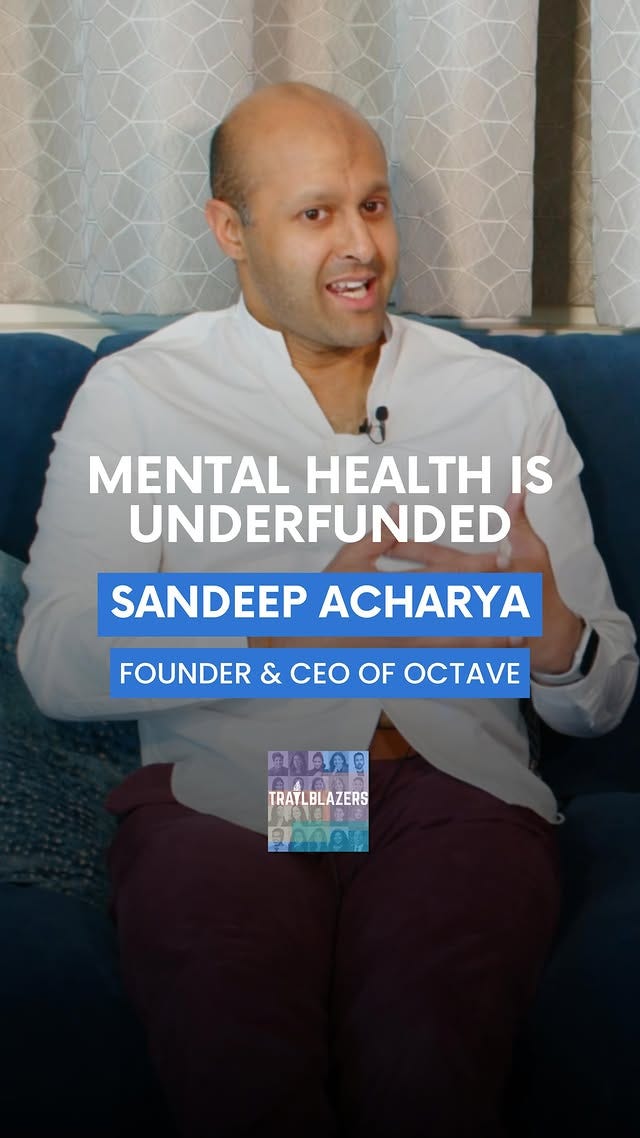🧠 Beating cancer—and building a mental health company to fix a broken system
Sandeep Acharya, Founder & CEO of Octave: on therapy, leadership, and building through uncertainty
Hi! Welcome back to South Asian Trailblazers — a media platform, community, and agency dedicated to elevating leading South Asians. Two weeks ago, I introduced you to Dilawar Syed — the Former Deputy Administrator of the U.S. Small Business Administrator. Moments from our episode with him went viral (the episode is at the bottom of this newsletter):
Today, I’m introducing you to Sandeep Acharya, Founder & CEO of Octave — a company transforming mental health care in America.
In this conversation, we go far beyond the bullet points — talking about his recent battle with cancer and what it really takes to build a company that’s both mission-driven and sustainable. Watch it on YouTube or listen on Apple, Spotify, and SouthAsianTrailblazers.com. & find the highlights on LinkedIn, Instagram, Facebook, and TikTok.
Season 8 Episode 5 🎤 Sandeep Acharya — Founder & CEO of Octave Health
Sandeep Acharya is the Founder & CEO of Octave, a company that’s reshaping the mental health care landscape by making exceptional care the standard.
Under his leadership, Octave has partnered with major insurers to make high-quality, affordable therapy accessible across 23 states. It’s been named one of the best places to work in the country several times.
Before founding Octave, Sandeep wore many hats: investor at Bain Capital and Insight, consultant at Bain & Company, and executive at One Medical — where he helped scale the company nationwide and saw firsthand how deeply unmet our mental health needs are. Select excerpts below — condensed and lightly edited for clarity!
On facing cancer — and celebrating joy
Simi: You're back at work after undergoing treatment for thyroid cancer. How did that experience shift your perspective?
Sandeep: You hear about how cancer forces you to reevaluate your priorities. I feel like my priorities were pretty good—family and work, they're fine. But I think I had taken the things I have for granted. One of those is music. I’ve been a lifelong musician... realizing I might lose that gift with my surgery made me realize there were so many things that, by not enjoying, I was doing myself a disservice. [...] I flew across the country to do karaoke with my 10 masala buddies. I threw a birthday party when I turned 40... and I realized: sometimes celebrating your gifts is a good thing. It’s not immodest. We should do it.
On the broken mental health system
Simi: What makes mental health care such a difficult problem to solve?
Sandeep: We under-reimburse mental health professionals by about $6 billion. Professionals can make 30% more just charging cash and not dealing with insurance. So prior to about five or six years ago, most professionals in America were not even taking insurance. That’s the first thing.
The second thing is it’s very hard to determine what good looks like. And the last thing is, it’s a very hard matching problem. When you combine those three or four things, what happens is four out of 10 patients quit in the first month of treatment. And it’s not only hard to find a practitioner, but when you find a practitioner, you’re don’t gett the help you need. And people say, 'Hey, I’m just not right for therapy.' Well, it’s actually not true....There isn’t enough work to make sure you end up with the right person. The real question is: how do we fix this market failure at scale?
On building Octave’s culture
Simi: Octave has been named a top place to work. How did you build that kind of culture?
Sandeep: I got great advice along the way from a coach who I work with, and one of the things that she told me is: you create your culture by how you treat your leadership team and how they interact with each other. The people that you bring in and the manner in which you interact informs how they interact with other people. I focused really hard on hiring a team that I felt was apolitical, was focused on the core mission, and was smart and assertive but not too aggressive. And then I tried to create a culture where we could openly disagree with each other, where we understood each other as humans, not just as workers. So one of the things that we do is a check-in where we spend 15 minutes before we start every meeting and we talk about something random, like, 'What’s your favorite show growing up?' Over time, people get to know each other on a really related level,







